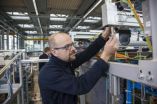(Press-News.org) Scientists of the Institute of Health Economics and Health Care Management (IGM) and of the Institute of Epidemiology II (EPI II) at Helmholtz Zentrum München (HMGU), together with colleagues of the German Diabetes Center (DDZ) in Düsseldorf, investigated the association between self-management behavior and mortality in patients with type 2 diabetes. HMGU and the DDZ are partners in the German Center for Diabetes Research (DZD).
High self-management index – low mortality
340 study participants with type 2 diabetes were interviewed with regard to their patient behavior – e.g. regular monitoring of blood glucose levels, having a diet plan or performing physical exercise. Based on this data a self-management index was defined. The team led by Professor Rolf Holle and Michael Laxy correlated the index with the mortality of the participants, who were monitored over a period of 12 years. The analysis showed that patients with good diabetes self-management, that is patients with a high self-management index, had a significantly lower mortality risk than patients with a low self-management index. This association exists independent of other factors that can influence mortality, such as age, sex, comorbidities or medication.
Active participation of the patient in the treatment is important
"The results show that in addition to physician delivered treatment according to medical guidelines, the patient's behavior is also of great significance for the course of the disease and for the success of the treatment process ", said Holle, group leader of the research group Economic Evaluation at the IGM. "Patient-centered services, such as diabetes education, self-management training and information services therefore make a valuable contribution to good patient care and should continue to be expanded."
The basis of the analyzed data is the KORA*-A study, which is composed of participants of two previous population-based health surveys and of the KORA Myocardial Infarction Registry from the Augsburg area.
Diabetes affects nearly ten percent of the population in Germany. The aim of Helmholtz Zentrum München is to develop new approaches to diagnosis, treatment and prevention of common diseases.
INFORMATION:
Further Information
* For more than 20 years, the research platform Cooperative Health Research in the Augsburg Region (KORA) has been collecting and analyzing data on the health of thousands of people living in the Augsburg region. The objective is to elucidate the effects of environmental factors, behavior and genes. KORA focuses on the development and course of chronic diseases, in particular myocardial infarction and diabetes mellitus. Risk factors are analyzed with regard to individual health behavior (e.g. smoking, diet, exercise), environmental factors (e.g. air pollution, noise) and genetics. From the perspective of health care research, questions regarding the utilization of health care resources and the cost of health care are also studied.
Original Publication:
Laxy, M. et al. (2014), The Association Between Patient-Reported Self-Management Behavior, Intermediate Clinical Outcomes, and Mortality in Patients With Type 2 Diabetes: Results From the KORA-A Study, Diabetes care, doi: 10.2337/dc13-2533
Link to publication: http://care.diabetesjournals.org/content/early/2014/03/13/dc13-2533.abstract
The Helmholtz Zentrum München, the German Research Center for Environmental Health, pursues the goal of developing personalized medicine, i.e. a customized approach to the diagnosis, treatment and prevention of widespread diseases such as diabetes mellitus and lung disease. To that end, it investigates the interaction of genetics, environmental factors and lifestyle. The Helmholtz Zentrum München is headquartered in Neuherberg in the north of Munich. It has about 2,200 staff members and is a member of the Helmholtz Association, Germany's largest scientific organization, a community of 18 scientific-technical and medical-biological research centers with some 34,000 staff members. The Helmholtz Zentrum München is a partner in the German Center for Diabetes Research. http://www.helmholtz-muenchen.de/index.html
The German Center for Diabetes Research e.V. brings together experts in the field of diabetes research and combines basic research, epidemiology and clinical applications. The members of the association are the German Diabetes Center (DDZ) in Düsseldorf, the German Institute of Human Nutrition (DifE) in Potsdam-Rehbrücke, the Helmholtz Zentrum München – the German Research Center for Environmental Health, the Paul Langerhans Institutes of the Carl Gustav Carus University Hospital in Dresden and the Eberhard Karl University of Tübingen as well as the Gottfried Wilhelm Leibniz Research Association and the Helmholtz Association of German Research Centers. The aim of the DZD is to find answers to unsolved questions in diabetes research by adopting a novel, integrative approach and to make a significant contribution towards improving the prevention, diagnosis and treatment of diabetes mellitus. http://www.diabetesforschung.com/index.html
The Institute of Health Economics and Health Care Management (IGM) examines approaches to improving the effectiveness and efficiency of health care. The health care system faces the challenge of delivering high-quality, economically viable medical services to meet the needs of the population. Rapid advances in medical technology and fast-changing demographics further aggravate this problem. A firmly based evaluation of the effectiveness and efficiency of health care structures and processes is therefore an essential prerequisite for a rational health care policy. http://www.helmholtz-muenchen.de/igm/index.html
The Institute of Epidemiology II (EPI II) focuses on the assessment of environmental and lifestyle risk factors which jointly affect major chronic diseases such as diabetes, heart disease and mental health. Research builds on the unique resources of the KORA cohort, the KORA myocardial infarction registry, and the KORA aerosol measurement station. Aging-related phenotypes have been added to the KORA research portfolio within the frame of the Research Consortium KORA-Age. The institute's contributions are specifically relevant for the population as modifiable personal risk factors are being researched that could be influenced by the individual or by improving legislation for the protection of public health. http://www.helmholtz-muenchen.de/epi2/index.html
Scientific contact
Prof. Rolf Holle, Institute of Health Economics and Health Care Management, Helmholtz Zentrum München - German Research Center for Environmental Health (GmbH), Ingolstädter Landstr. 1, 85764 Neuherberg, Germany, Tel. +49 89-3187-4192 - E-Mail: holle@helmholtz-muenchen.de
Diabetes: Good self-management helps to reduce mortality
2014-03-26
ELSE PRESS RELEASES FROM THIS DATE:
Real-life CSI: What can investigators really tell from gunshot residue?
2014-03-26
The popular TV series "CSI" is fiction, but every day, real-life investigators and forensic scientists collect and analyze evidence to determine what happened at crime scenes. In a study published in the ACS journal Analytical Chemistry, scientists say they have developed a more rapid and accurate method that could allow crime scene investigators to tell what kind of ammunition was shot from a gun based on the residue it left behind.
Igor K. Lednev and Justin Bueno point out that when someone fires a gun, burnt particles from the bullet spray out of the weapon onto a ...
Electroacupuncture at Conception and Governor vessels and hUCB-MSCs for cerebral ischemia
2014-03-26
Mesenchymal stem cell transplantation is a novel means of treating cerebral ischemia/reperfusion, and can promote angiogenesis and neurological functional recovery. Acupuncture at Conception and Governor vessels also has positive effects as a treatment for cerebral ischemia/reperfusion. Therefore, Prof. Haibo Yu and co-workers from Affiliated Shenzhen Traditional Chinese Medicine Hospital, Guangzhou University of Chinese Medicine in China hypothesized that electro-acupuncture at Conception and Governor vessels plus mesenchymal stem cell transplantation may have better therapeutic ...
Beer marinade could reduce levels of potentially harmful substances in grilled meats
2014-03-26
The smells of summer — the sweet fragrance of newly opened flowers, the scent of freshly cut grass and the aroma of meats cooking on the backyard grill — will soon be upon us. Now, researchers are reporting that the very same beer that many people enjoy at backyard barbeques could, when used as a marinade, help reduce the formation of potentially harmful substances in grilled meats. The study appears in ACS' Journal of Agricultural and Food Chemistry.
I.M.P.L.V.O. Ferreira and colleagues explain that past studies have shown an association between consumption of grilled ...
Research produces strong evidence for a new class of antidepressant drugs
2014-03-26
Scientists have shown for the first time that a chemical in the brain called galanin is involved in the risk of developing depression.
And the research, undertaken by a European research team, points to a strong reason to develop drugs that modify galanin functioning as a new class of antidepressant drug.
Galanin is a neuropeptide (a small protein) that was discovered and investigated over 30 years ago by various groups including the Swedish scientist Tomas Hokfelt. He is one of the senior authors of the paper published in the journal PNAS.
Professor Hokfelt and ...
First images available from NASA-JAXA global rain and snowfall satellite
2014-03-26
NASA and the Japan Aerospace Exploration Agency (JAXA) have released the first images captured by their newest Earth-observing satellite, the Global Precipitation Measurement (GPM) Core Observatory, which launched into space Feb. 27.
The images show precipitation falling inside a March 10 cyclone over the northwest Pacific Ocean, approximately 1,000 miles east of Japan. The data were collected by the GPM Core Observatory's two instruments: JAXA's Dual-frequency Precipitation Radar (DPR), which imaged a three-dimensional cross-section of the storm; and, NASA's GPM Microwave ...
The advantages of entering the workforce in a recession
2014-03-26
Despite the well-documented disadvantages of graduating from college during a recession, could graduates actually be happier with their jobs in the long run?
A new article from Administrative Science Quarterly examines whether earning a college or graduate degree in a recession or an economic boom has lasting effects on job satisfaction. Across three studies, well-educated graduates who entered the workforce during economic downturns were happier with their work than those who first searched for jobs during more prosperous times. In fact, they were happier with their ...
Immunotherapy data heralds new era of lung cancer treatment
2014-03-26
Geneva, Switzerland, 26 March 2014 -- A new era of lung cancer therapy is close to dawning, using drugs that can prevent tumour cells from evading the immune system, experts have said at the 4th European Lung Cancer Congress.
For decades, scientists and doctors thought immunotherapy –treatments that harness the immune system to fight a disease-- was of marginal benefit in lung cancer, says Jean-Charles Soria, Institute Gustave Roussy in Paris, France.
However a new class of drugs known as "immunocheckpoint regulators" have shown huge potential, Soria says. New data ...
Planning and building products and production plants simultaneously
2014-03-26
In early 2010, LANXESS decided to enter a new field of business, water purification: A production facility for Lewabrane reverse osmosis membrane filter elements was supposed to be built by the fall of 2011. Together with the company's experts, researchers from the Fraunhofer Institute for Factory Operation and Automation IFF in Magdeburg designed and had the manufacturing technology ready for production in just nine months. Afterward, they built a second, fully automatic and, therefore, more complex plant in just one year. Part of this plant – scaled down – will be on ...
Harvard scientists visualize new treatments for retinal blindness
2014-03-26
A new report published online in The FASEB Journal may lead the way toward new treatments or a cure for a common cause of blindness (proliferative retinopathies). Specifically, scientists have discovered that the body's innate immune system does more than help ward off external pathogens. It also helps remove sight-robbing abnormal blood vessels, while leaving healthy cells and tissue intact. This discovery is significant as the retina is part of the central nervous system and its cells cannot be replaced once lost. Identifying ways to leverage the innate immune system ...
Genetics can explain why infections can trigger rheumatoid arthritis
2014-03-26
A new international study has revealed how genetics could explain why different environmental exposures can trigger the onset of different forms of rheumatoid arthritis.
A team at the Arthritis Research UK Centre for Genetics and Genomics at The University of Manchester, part of a large international consortium involving scientists from across 15 academic institutions, believe their findings could have important implication for the way that rheumatoid arthritis is diagnosed and treated.
Publishing their findings in the journal American Journal of Human Genetics, they ...


